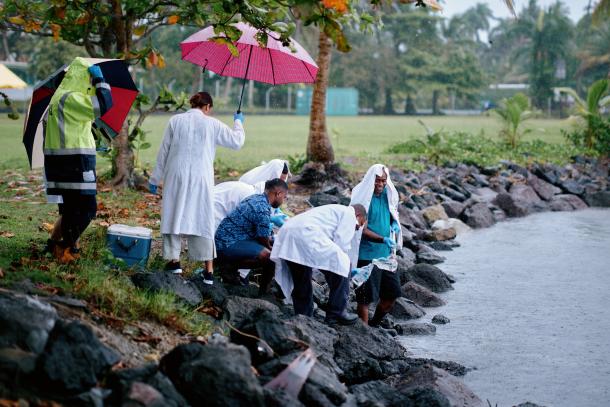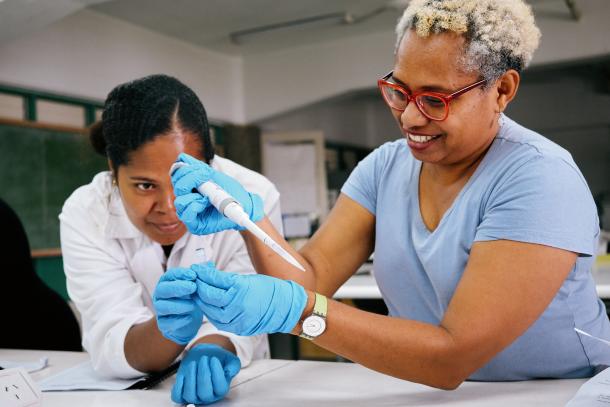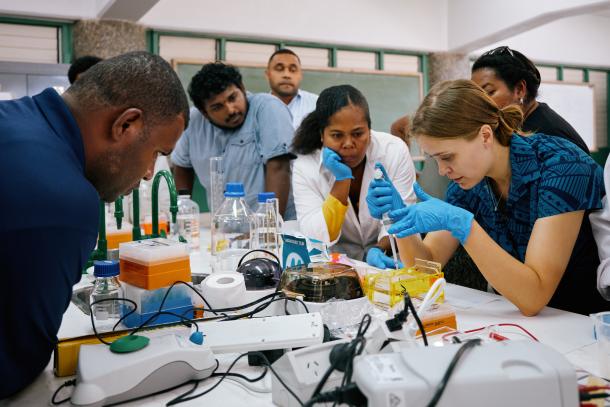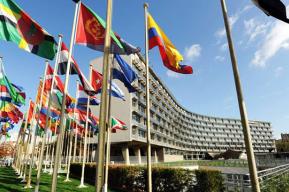Marine biodiversity is vital for the livelihoods of pacific islanders. The health of the marine ecosystem, and in turn the people who utilize it, depends on a careful balance between the health and diversity of species normally living in the environment and human development. Introduced species are species that are not native to the local environment and can disrupt the natural balance by establishing into new areas via shipping pathways and overtaking the native species. Many marine species move around the world with international shipping traffic, attached to the hulls of vessels or in ballast water. Once the new species becomes established, it is very difficult and costly to eradicate or manage them. Therefore early detections, and regular monitoring are vital, so that any new species can be intercepted on their arrival, and the native communities can be protected.
Scientists and conservationists are using environmental DNA (eDNA) technology to detect hundreds of species by extracting and sequencing the DNA they release into the seawater. eDNA analysis has greatly improved our ability to detect species in the environment. With simple sampling methods, and no need for extensive taxonomic expertise, eDNA can provide a snapshot of marine biodiversity at the site.
The methodology is simple and accessible to most countries and local institutions engaged in biodiversity conservation: one litre of water is collected from the environment, the DNA is extracted from this sample, and the species that are in the location can be analysed through PCR and sequencing of the DNA sample. This non-invasive method can provide information of the presence of hundreds of species from one sample, and help in identifying species that are difficult to detect visually.

To enhance local capacities on eDNA analysis in Fiji, UNESCO recently organized a training course on eDNA for local managers and technicians, to prepare them for sample collection and the sorting of organisms identified. The training covered field sample collection and sample processing for DNA extraction, eDNA and PCR analyses, as well as data analysis and sharing protocols.

This is the first eDNA training course ever held in Fiji. The few eDNA experts in Fiji have all been trained outside of Fiji. I did my training in Japan. The PacMAN project has been very important to optimize the protocols and the monitoring to work in marine waters of Fiji ahead of this training course. With aquatic Biosecurity as an area of concern to the Pacific, the current capacity building program undertaken by the PacMAN project can be extended to other SPC member countries to develop their capacities in eDNA and early detection. As part of SPC, we also anticipate incorporating pathogen detection for the food safety and animal health of aquacultured and food fish species in the Pacific.
The training was organized in the context of UNESCO’s Pacific Islands Marine Biodiversity Alert Network (PacMAN) Project, an initiative endorsed by the UN Decade of Ocean Science for Sustainable Development 2021-2030.

Developing scientific capacity in Fiji for early detection using environmental DNA is an important step in the establishment of a regional early warning system (alert network) for marine invasive species in the Pacific Islands. We hope eDNA-based surveillance against marine invasive species will become a long-term sustained activity in Fiji and gradually roll out in other Island states effectively forming an interconnected network.
The Institute of Applied Sciences at the University of the South Pacific (USP) hosted the UNESCO training, which included participants from across a wide range of stakeholder organizations, including the Biosecurity Authority of Fiji, the Fiji Ports Corporation Pte Limited , the Maritime Safety Authority, the Secretariat of the South Pacific, and members of academia.
The training also included strong participation at Fiji’s ministerial level, with participants from the Ministry of Fisheries, and the Ministry of Health & Medical Services.
We thank the PacMAN project team for this great opportunity. It is a new tool that will complement the existing tools we are currently using to assess the status of our fisheries and contribute to sustainable fisheries management and conservation. Effective collaboration with relevant government agencies, academia, regional and international partners is crucial for implementing the eDNA tool for early detection of invasive species on our borders.
For the Ministry of Health & Medical Services it is important to explore improved collaboration of our border health and academia in a scientific environment. PacMAN helps boost the local capability for early detection and warning of marine invasive alien species by developing a surveillance system that can better detect and improve our knowledge and create awareness as we work towards a healthier planet under the WHO initiative
The training course involved 21 trainees, and was supported by the Biosecurity Authority of Fiji with funding from the Invasive Alien Species Project of the Global Environment Fund and the United Nations Development Program, as well as from the UNESCO PacMAN Project.
***
For more information, please contact:
UNESCO / Intergovernmental Oceanographic Commission: Ward Appeltans: w.appeltans@unesco.org
Pictures available: https://www.flickr.com/photos/143400023@N08/albums/72177720304000009
About PacMAN:
The Pacific islands Marine Bioinvasions Alert Network (PacMAN) project is a UNESCO project that aims to develop a marine invasive species monitoring system as well as an early-warning decision-support tool for Pacific Island States. PacMAN will be gathering marine biodiversity data by analysing DNA from samples collected at the Suva Port in Fiji. The project will therefore provide vital baseline information on marine biodiversity as well as provide support to Fiji’s national management agencies to prepare and react to incursions of unwanted species coming in via international ships. The PacMAN project runs for 3-years (2020-2023) and is funded by the Flanders Government (Kingdom of Belgium), through the Flanders UNESCO Trust Fund (FUST) for the support of UNESCO’s activities in the field of Science, and co-funded by the Richard Lounsbery Foundation.
About IOC/UNESCO:
The Intergovernmental Oceanographic Commission of UNESCO (IOC-UNESCO) promotes international cooperation in marine sciences to improve management of the ocean, coasts and marine resources. The IOC enables its 150 Member States to work together by coordinating programmes in capacity development, ocean observations and services, ocean science, tsunami warning and ocean literacy. The work of the IOC contributes to the mission of UNESCO to promote the advancement of science and its applications to develop knowledge and capacity, key to economic and social progress, the basis of peace and sustainable development.
About the Ocean Decade:
Proclaimed in 2017 by the United Nations General Assembly, the UN Decade of Ocean Science for Sustainable Development (2021-2030) (‘the Ocean Decade’) seeks to stimulate ocean science and knowledge generation to reverse the decline of the state of the ocean system and catalyse new opportunities for sustainable development of this massive marine ecosystem. The vision of the Ocean Decade is ‘the science we need for the ocean we want’. The Ocean Decade provides a convening framework for scientists and stakeholders from diverse sectors to develop the scientific knowledge and the partnerships needed to accelerate and harness advances in ocean science to achieve a better understanding of the ocean system, and deliver science-based solutions to achieve the 2030 Agenda. The UN General Assembly mandated UNESCO's Intergovernmental Oceanographic Commission (IOC) to coordinate the preparations and implementation of the Decade.










